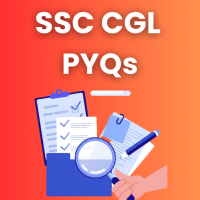SSC CGL Exam > SSC CGL Questions > Transform the sentence "He said, 'I'll call y...
Start Learning for Free
Transform the sentence "He said, 'I'll call you later'" into indirect speech.
- a)He said that he would call me later.
- b)He said that he will call me later.
- c)He said that he would call me tomorrow.
- d)He said that he will call me tomorrow.
Correct answer is option 'A'. Can you explain this answer?
Verified Answer
Transform the sentence "He said, 'I'll call you later'" into indirect ...
The future tense "will" changes to "would" in indirect speech. Therefore, the correct transformation is "He said that he would call me later."
View all questions of this test
Most Upvoted Answer
Transform the sentence "He said, 'I'll call you later'" into indirect ...
Understanding Indirect Speech
Indirect speech, also known as reported speech, is used to convey what someone has said without quoting their exact words. It involves changes in pronouns, verb tenses, and time phrases.
Why Option A is Correct
Option A states: *"He said that he would call me later."* This transformation adheres to the rules of indirect speech by:
- Changing Pronouns:
- "I" changes to "he" to match the subject being reported.
- Shifting Verb Tense:
- The present tense "will" changes to "would" in order to reflect the past tense of "said."
- Maintaining Time Reference:
- "Later" remains unchanged as it is still a relevant time reference.
Why Other Options are Incorrect
- Option B: *"He said that he will call me later."*
- This retains "will," which is incorrect because the reporting verb "said" requires backshifting to "would" in indirect speech.
- Option C: *"He said that he would call me tomorrow."*
- The shift from "later" to "tomorrow" changes the original meaning of the statement.
- Option D: *"He said that he will call me tomorrow."*
- Similar to Option B, this incorrectly uses "will" and alters the meaning by changing "later" to "tomorrow."
Conclusion
Understanding the nuances of indirect speech is essential for accurate reporting of statements. Option A is the only choice that correctly follows the rules, ensuring both grammatical accuracy and fidelity to the original message.
Indirect speech, also known as reported speech, is used to convey what someone has said without quoting their exact words. It involves changes in pronouns, verb tenses, and time phrases.
Why Option A is Correct
Option A states: *"He said that he would call me later."* This transformation adheres to the rules of indirect speech by:
- Changing Pronouns:
- "I" changes to "he" to match the subject being reported.
- Shifting Verb Tense:
- The present tense "will" changes to "would" in order to reflect the past tense of "said."
- Maintaining Time Reference:
- "Later" remains unchanged as it is still a relevant time reference.
Why Other Options are Incorrect
- Option B: *"He said that he will call me later."*
- This retains "will," which is incorrect because the reporting verb "said" requires backshifting to "would" in indirect speech.
- Option C: *"He said that he would call me tomorrow."*
- The shift from "later" to "tomorrow" changes the original meaning of the statement.
- Option D: *"He said that he will call me tomorrow."*
- Similar to Option B, this incorrectly uses "will" and alters the meaning by changing "later" to "tomorrow."
Conclusion
Understanding the nuances of indirect speech is essential for accurate reporting of statements. Option A is the only choice that correctly follows the rules, ensuring both grammatical accuracy and fidelity to the original message.

|
Explore Courses for SSC CGL exam
|

|
Question Description
Transform the sentence "He said, 'I'll call you later'" into indirect speech.a)He said that he would call me later.b)He said that he will call me later.c)He said that he would call me tomorrow.d)He said that he will call me tomorrow.Correct answer is option 'A'. Can you explain this answer? for SSC CGL 2025 is part of SSC CGL preparation. The Question and answers have been prepared according to the SSC CGL exam syllabus. Information about Transform the sentence "He said, 'I'll call you later'" into indirect speech.a)He said that he would call me later.b)He said that he will call me later.c)He said that he would call me tomorrow.d)He said that he will call me tomorrow.Correct answer is option 'A'. Can you explain this answer? covers all topics & solutions for SSC CGL 2025 Exam. Find important definitions, questions, meanings, examples, exercises and tests below for Transform the sentence "He said, 'I'll call you later'" into indirect speech.a)He said that he would call me later.b)He said that he will call me later.c)He said that he would call me tomorrow.d)He said that he will call me tomorrow.Correct answer is option 'A'. Can you explain this answer?.
Transform the sentence "He said, 'I'll call you later'" into indirect speech.a)He said that he would call me later.b)He said that he will call me later.c)He said that he would call me tomorrow.d)He said that he will call me tomorrow.Correct answer is option 'A'. Can you explain this answer? for SSC CGL 2025 is part of SSC CGL preparation. The Question and answers have been prepared according to the SSC CGL exam syllabus. Information about Transform the sentence "He said, 'I'll call you later'" into indirect speech.a)He said that he would call me later.b)He said that he will call me later.c)He said that he would call me tomorrow.d)He said that he will call me tomorrow.Correct answer is option 'A'. Can you explain this answer? covers all topics & solutions for SSC CGL 2025 Exam. Find important definitions, questions, meanings, examples, exercises and tests below for Transform the sentence "He said, 'I'll call you later'" into indirect speech.a)He said that he would call me later.b)He said that he will call me later.c)He said that he would call me tomorrow.d)He said that he will call me tomorrow.Correct answer is option 'A'. Can you explain this answer?.
Solutions for Transform the sentence "He said, 'I'll call you later'" into indirect speech.a)He said that he would call me later.b)He said that he will call me later.c)He said that he would call me tomorrow.d)He said that he will call me tomorrow.Correct answer is option 'A'. Can you explain this answer? in English & in Hindi are available as part of our courses for SSC CGL.
Download more important topics, notes, lectures and mock test series for SSC CGL Exam by signing up for free.
Here you can find the meaning of Transform the sentence "He said, 'I'll call you later'" into indirect speech.a)He said that he would call me later.b)He said that he will call me later.c)He said that he would call me tomorrow.d)He said that he will call me tomorrow.Correct answer is option 'A'. Can you explain this answer? defined & explained in the simplest way possible. Besides giving the explanation of
Transform the sentence "He said, 'I'll call you later'" into indirect speech.a)He said that he would call me later.b)He said that he will call me later.c)He said that he would call me tomorrow.d)He said that he will call me tomorrow.Correct answer is option 'A'. Can you explain this answer?, a detailed solution for Transform the sentence "He said, 'I'll call you later'" into indirect speech.a)He said that he would call me later.b)He said that he will call me later.c)He said that he would call me tomorrow.d)He said that he will call me tomorrow.Correct answer is option 'A'. Can you explain this answer? has been provided alongside types of Transform the sentence "He said, 'I'll call you later'" into indirect speech.a)He said that he would call me later.b)He said that he will call me later.c)He said that he would call me tomorrow.d)He said that he will call me tomorrow.Correct answer is option 'A'. Can you explain this answer? theory, EduRev gives you an
ample number of questions to practice Transform the sentence "He said, 'I'll call you later'" into indirect speech.a)He said that he would call me later.b)He said that he will call me later.c)He said that he would call me tomorrow.d)He said that he will call me tomorrow.Correct answer is option 'A'. Can you explain this answer? tests, examples and also practice SSC CGL tests.

|
Explore Courses for SSC CGL exam
|

|
Signup for Free!
Signup to see your scores go up within 7 days! Learn & Practice with 1000+ FREE Notes, Videos & Tests.


















